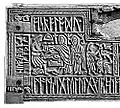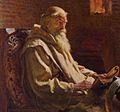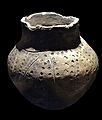Anglo-Saxon mythology facts for kids
Anglo-Saxon mythology refers to the old beliefs and stories of the early English people. These people, called Anglo-Saxons, lived in England from about the 400s to the 600s. They had their own gods and myths before they became Christian.
Contents
Origins and History
The Anglo-Saxons were made up of different tribes like the Angles, Saxons, and Jutes. They came to Britain from places like southern Scandinavia, the Netherlands, and northern Germany. Our modern English language actually comes from these people!
It's hard to know exactly what Anglo-Saxon myths were like. This is because they mostly told their stories by speaking them, not by writing them down. Traveling poets and singers, called "scops," would share these tales. Also, most of the writings we have from that time were changed by Christian monks later on.
One important book is by a Christian monk named Bede. He wrote about the old English calendar. The famous poem Beowulf also tells us a lot about Anglo-Saxon times. But even Beowulf was written for a Christian audience, so it talks about the Christian God. The only old poem that hasn't been changed by Christian writers is a small piece called the Finnsburgh Fragment.
Beliefs
The Anglo-Saxons believed in magical creatures. These included elves, dwarves, and giants, which they called "Etins." These creatures often caused trouble for people.
They also believed in something called Wyrd. This is often translated as "fate," but it meant something deeper. It was like a powerful force that shaped events and people's lives.
Like other Germanic people, the Anglo-Saxons worshipped similar gods to the Norse people (from Scandinavia). The names were a bit different because of language differences. For example, the Anglo-Saxon god Thunor was the same as the Norse god Thor. And Woden was the same as the Norse god Odin.
The Gods
Here are some of the main gods and goddesses the Anglo-Saxons believed in:
| Anglo Saxon | Old German | Norse equivalent |
|---|---|---|
| Wōden | Wodan | Odin |
| Thunor | Donar | Thór |
| Tíw | Zîu | Týr |
| Seaxnéat | Saxnôte | none |
| Géat | Gausus | Gautr |
| *Fríge | Freja | Frigg |
| Éostre | *Ôstara | Possibly Idunn |
| Ing | none | Yngvi-Freyr |
| Baldaeg | Baldere | Baldr |
| Hama | Heime | Heimdallr |
The Ése
The Ése were a group of gods, similar to the Norse Æsir.
Woden was a very important god. He was seen as the leader of the Wild Hunt, a ghostly group that carried off the dead. Many early Anglo-Saxon kings said they were related to Woden. Our modern Wednesday ("Woden's day") is named after him.
Thunor was the god of thunder, storms, and the sky. He also protected humans from giants. He was very popular among common people. Our modern Thursday ("Thunor's Day") is named after him.
Fríge was the goddess of love and the wife of Woden. She was one of the most powerful goddesses. Our modern Friday is named after her, though some think it's named after Freya.
Tiw was the god of war and battle. Our modern Tuesday ("Tiu's day") is named after him. Some believe he was once the most important god, before Woden.
The Wen
The Wen were another group of gods, similar to the Norse Vanir.
Ingui Fréy was a very popular god. He was the god of fertility, meaning he helped crops grow and animals have babies. He also brought peace and good harvests. The royal family of Sweden, the Ynglings, claimed to be his descendants.
Freya, or Freo, was said to be the most beautiful goddess. She was also a goddess of love, but different from Fríge, who was more about marriage. Freya was also connected to wealth, especially metals and gems. She was also a goddess of magic.
Neorth was the father of Frey and Freya. He was the god of the seas and trade. Sailors and fishermen would pray to him for safe journeys and good catches. He was also connected to wealth from the sea.
Other Gods and Heroes
Hengest and Horsa were two legendary leaders who helped the Anglo-Saxons settle in England. Their names mean "stallion" and "horse," and the horse was an important symbol in Anglo-Saxon mythology.
Wayland was a mythical smith, a skilled craftsman. He was thought to be an elvish being who could change shape. His image is on an old Anglo-Saxon box called the Franks Casket, showing his importance for wealth and partnerships.
Eorthe, whose name means "Earth," was the wife of Woden and the mother of Thunor. She was the goddess of the Earth and represented its strength.
Eostre was a goddess whose festival was celebrated in Spring. Saint Bede, a monk, said that the Christian holiday of Easter got its name from her festival.
Niht was the Goddess of Night and the mother of Eorthe.
Sigel was the Goddess of the Sun. Her day, of course, is Sunday.
Practices
Anglo-Saxon religious practices were similar to those of other Germanic people, like the Norse.
- This was a sacrifice. The month of November was even called blótmónath in Old English, meaning "month of sacrifice." This is because the Anglo-Saxons would offer animals to their gods during this month. The English word "bless" actually comes from an old word meaning "to smear with blood," which shows how important sacrifices were.
- This was a special drinking feast, usually with mead (an alcoholic drink). People believed they could gain magical knowledge and good fortune during these feasts. At a symbel, there was a host (the symbelgifa), a poet (the scop), someone to serve the drinks (the alekeeper), and someone to keep order (the thyle).
It's also possible that Anglo-Saxons practiced magic and worshipped water, trees, and stones in different ways.
Modern Influence
| Day | Origin |
|---|---|
| Sunday | Sunne's day |
| Monday | Mōna's day |
| Tuesday | Tiw's day |
| Wednesday | Wóden 's day |
| Thursday | Thunor's day |
| Friday | Frige's day |
The old Germanic gods still affect our lives today, especially in countries that speak Germanic languages like English. For example, many of our days of the week are named after these gods!
While Sunday and Monday are named after the Sun and Moon, the names for Tuesday through Friday come from Germanic gods. Tuesday is Tiw's day, Wednesday is Woden's day, Thursday is Thunor's day, and Friday is Frige's day.
Many places in England are also named after these old gods. For example, Woodway House might be named after Woden, and Thundersley after Thunor.
Modern Popular Culture
The famous author J.R.R. Tolkien, who wrote The Lord of the Rings, was greatly influenced by Anglo-Saxon myths. Because his books became so popular, many ideas from Germanic myths, like elves, dwarves, and giants, are now common in almost all modern fantasy stories. Tolkien also used his knowledge of Anglo-Saxon history and language to create his own rich fantasy world.
Images for kids
-
The right half of the front panel of the 7th century Franks Casket, showing the legend of Wayland the Smith
-
An early 20th century picture of Bede, who wrote a lot about Anglo-Saxon paganism.
-
Roseberry Topping in North Yorkshire, once called the 'Hill of Óðin'
-
A 1908 picture of Beowulf fighting the dragon.
-
The ancient burial mound of Wayland's Smithy might have been a special place for the Anglo-Saxons.
-
A burial urn from the Snape Anglo-Saxon Cemetery.
 | Kyle Baker |
 | Joseph Yoakum |
 | Laura Wheeler Waring |
 | Henry Ossawa Tanner |








